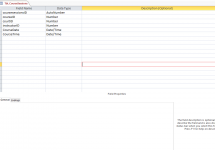Hi, i am trying to make a simple DB for scheduling tennis courses ( course, instructor, court, date and time ) and that info
is held in a table Tbl_CourseSessions
Need to index the table properly and I am stuck because i cant think more of how to ensure that, because
otherwise there will be duplicate records
Need to ensure that:
A) same day and time an instructor can not instruct (course is irrelevant - same course can be instructed by others by another same time same day)
B) A court cannot be chosen same day same time (of case course doesn't matter)
i have read this article http://www.geeksengine.com/article/composite-unique-index-access.html
but i managed to make similar but more simple conditions happen in cases where one instructor
cannot be double registered in a year
This is something more
is held in a table Tbl_CourseSessions
Need to index the table properly and I am stuck because i cant think more of how to ensure that, because
otherwise there will be duplicate records
Need to ensure that:
A) same day and time an instructor can not instruct (course is irrelevant - same course can be instructed by others by another same time same day)
B) A court cannot be chosen same day same time (of case course doesn't matter)
i have read this article http://www.geeksengine.com/article/composite-unique-index-access.html
but i managed to make similar but more simple conditions happen in cases where one instructor
cannot be double registered in a year
This is something more

